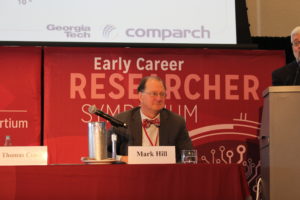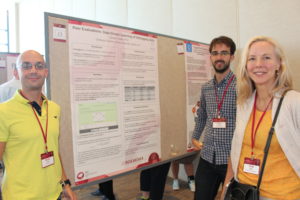 In August, the Computing Community Consortium (CCC) held the Early Career Researcher Symposium (ECR) as a capstone event for the CIFellows program. It brought together 73 former CIFellows, postdoctoral students, and early career researchers in computing. The speakers were CS faculty members well established in their careers, government representatives from agencies such as National Science Foundation (NSF), National Institutes of Health (NIH), Defense Advanced Research Projects Agency (DARPA), and Intelligence Advanced Research Projects Activity (IARPA), Computing Research Association (CRA) and CCC council members and staff, and program managers from non-profits.
In August, the Computing Community Consortium (CCC) held the Early Career Researcher Symposium (ECR) as a capstone event for the CIFellows program. It brought together 73 former CIFellows, postdoctoral students, and early career researchers in computing. The speakers were CS faculty members well established in their careers, government representatives from agencies such as National Science Foundation (NSF), National Institutes of Health (NIH), Defense Advanced Research Projects Agency (DARPA), and Intelligence Advanced Research Projects Activity (IARPA), Computing Research Association (CRA) and CCC council members and staff, and program managers from non-profits.
The goal of the ECR was to provide the early career researchers advice at this juncture of their career, enable them to network with other people at similar stages of their career, discuss emergent research visions and topics with luminaries in the field, and to learn about the policy work done that impacts a research career, and how they can get involved. It was also an opportunity for attendees to meet Federal Agency Representatives. There were three sections during the event (career, visioning, and government) as well as a poster session where participants could present their work.
The career session included a talk from Shwetak Patel, from the University of Washington, who listed the “4D’s” which is his strategy on handling various tasks that he is asked to do. They stand for delete (do you even need to do it?), defer (can you ask for an extension?), delegate (is there someone else that can do it?), and diminish (can you do it with less perfection?).
In the visioning session, all the CCC Task Forces presented about their current work and the upcoming events that CCC has. Most importantly, however, the task force leaders listened to the audience and took notes on their suggestions and recommendation for next steps on various hot topics.
During the government session, CRA’s Government Director, Peter Harsha, presented on the current state of affairs of science policy. He then encouraged participants to get involved in CRA and CCC’s activities (such as LiSPI) when the time is right for them professionally. Finally, participants were able to sit down and talk one-on-one with representatives from NSF, NIST, NIH, DARPA, and IARPA. These conversations continued into lunch and gave participants plenty of time to get their questions answered.
 Poster presenters included early career faculty members, post-docs, and graduate students from many fields of computer science. The poster session was originally scheduled for only an hour, but conversations continued until the early evening. All poster presenters were offered the chance to record a short video clip of their presentation. You can see them here.
Poster presenters included early career faculty members, post-docs, and graduate students from many fields of computer science. The poster session was originally scheduled for only an hour, but conversations continued until the early evening. All poster presenters were offered the chance to record a short video clip of their presentation. You can see them here.
For more information about the ECR, please see this website, and continue to follow this blog where we will post more specific pieces on different parts of the event, including thoughts from the participants.










Trackbacks /
Pingbacks